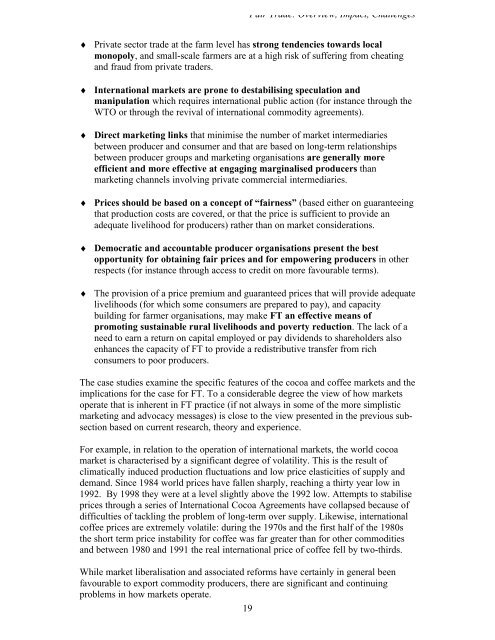Fair Trade: Overview, Impact, Challenges - Are you looking for one ...
Fair Trade: Overview, Impact, Challenges - Are you looking for one ...
Fair Trade: Overview, Impact, Challenges - Are you looking for one ...
You also want an ePaper? Increase the reach of your titles
YUMPU automatically turns print PDFs into web optimized ePapers that Google loves.
<strong>Fair</strong> <strong>Trade</strong>: <strong>Overview</strong>, <strong>Impact</strong>, <strong>Challenges</strong><br />
♦ Private sector trade at the farm level has strong tendencies towards local<br />
monopoly, and small-scale farmers are at a high risk of suffering from cheating<br />
and fraud from private traders.<br />
♦ International markets are pr<strong>one</strong> to destabilising speculation and<br />
manipulation which requires international public action (<strong>for</strong> instance through the<br />
WTO or through the revival of international commodity agreements).<br />
♦ Direct marketing links that minimise the number of market intermediaries<br />
between producer and consumer and that are based on long-term relationships<br />
between producer groups and marketing organisations are generally more<br />
efficient and more effective at engaging marginalised producers than<br />
marketing channels involving private commercial intermediaries.<br />
♦ Prices should be based on a concept of “fairness” (based either on guaranteeing<br />
that production costs are covered, or that the price is sufficient to provide an<br />
adequate livelihood <strong>for</strong> producers) rather than on market considerations.<br />
♦ Democratic and accountable producer organisations present the best<br />
opportunity <strong>for</strong> obtaining fair prices and <strong>for</strong> empowering producers in other<br />
respects (<strong>for</strong> instance through access to credit on more favourable terms).<br />
♦ The provision of a price premium and guaranteed prices that will provide adequate<br />
livelihoods (<strong>for</strong> which some consumers are prepared to pay), and capacity<br />
building <strong>for</strong> farmer organisations, may make FT an effective means of<br />
promoting sustainable rural livelihoods and poverty reduction. The lack of a<br />
need to earn a return on capital employed or pay dividends to shareholders also<br />
enhances the capacity of FT to provide a redistributive transfer from rich<br />
consumers to poor producers.<br />
The case studies examine the specific features of the cocoa and coffee markets and the<br />
implications <strong>for</strong> the case <strong>for</strong> FT. To a considerable degree the view of how markets<br />
operate that is inherent in FT practice (if not always in some of the more simplistic<br />
marketing and advocacy messages) is close to the view presented in the previous subsection<br />
based on current research, theory and experience.<br />
For example, in relation to the operation of international markets, the world cocoa<br />
market is characterised by a significant degree of volatility. This is the result of<br />
climatically induced production fluctuations and low price elasticities of supply and<br />
demand. Since 1984 world prices have fallen sharply, reaching a thirty year low in<br />
1992. By 1998 they were at a level slightly above the 1992 low. Attempts to stabilise<br />
prices through a series of International Cocoa Agreements have collapsed because of<br />
difficulties of tackling the problem of long-term over supply. Likewise, international<br />
coffee prices are extremely volatile: during the 1970s and the first half of the 1980s<br />
the short term price instability <strong>for</strong> coffee was far greater than <strong>for</strong> other commodities<br />
and between 1980 and 1991 the real international price of coffee fell by two-thirds.<br />
While market liberalisation and associated re<strong>for</strong>ms have certainly in general been<br />
favourable to export commodity producers, there are significant and continuing<br />
problems in how markets operate.<br />
19
















![CynefinFramework final [Read-Only]](https://img.yumpu.com/19017304/1/190x135/cynefinframework-final-read-only.jpg?quality=85)